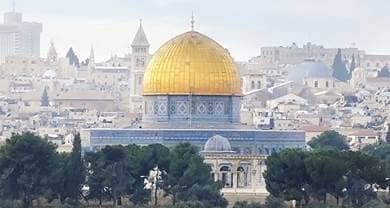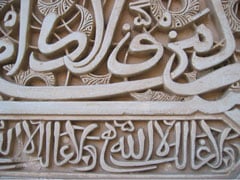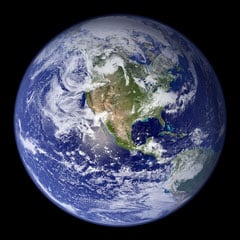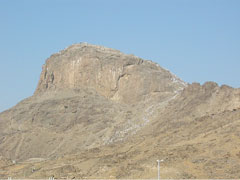- Trending:
- Pope Leo Xiv
- |
- Israel
- |
- Trump
- |
- Social Justice
- |
- Peace
- |
- Love

RELIGION LIBRARY
Islam
Ultimate Reality and Divine Beings
 Submission to God lies at the very heart of Islam. The word islam means "surrender," or "submission," or "peace," and the fundamental meaning of Islam is "surrender to God." One who surrenders to God and recognizes Muhammad as God's prophet is a Muslim. Arabic is the language of the first Muslims and of the Quran, and in Arabic, the word for God is Allah, or "The God." Arabic-speaking Christians also use "Allah" when speaking of God and praying to God. Islam teaches that Allah is the same God worshipped by Jews and Christians.
Submission to God lies at the very heart of Islam. The word islam means "surrender," or "submission," or "peace," and the fundamental meaning of Islam is "surrender to God." One who surrenders to God and recognizes Muhammad as God's prophet is a Muslim. Arabic is the language of the first Muslims and of the Quran, and in Arabic, the word for God is Allah, or "The God." Arabic-speaking Christians also use "Allah" when speaking of God and praying to God. Islam teaches that Allah is the same God worshipped by Jews and Christians.
For Muslims, the Quran is the most important source of knowledge about God. In a popular verse called the "Throne Verse" (surah 2.255), the Quran describes God in this way:
 God, there is no god but He, the living, the self-subsistent. Slumber takes Him not, nor sleep. His is what is in the heavens and what is in the earth. Who is it that intercedes with Him save by His permission? He knows what is before them and what behind them, and they comprehend not aught of His knowledge but of what He pleases. His throne extends over the heavens and the earth, and it tires Him not to guard them both, for He is high and grand.
God, there is no god but He, the living, the self-subsistent. Slumber takes Him not, nor sleep. His is what is in the heavens and what is in the earth. Who is it that intercedes with Him save by His permission? He knows what is before them and what behind them, and they comprehend not aught of His knowledge but of what He pleases. His throne extends over the heavens and the earth, and it tires Him not to guard them both, for He is high and grand.
 The Quran describes God as the creator and ruler of all things, and the judge of all things. He is all-powerful, all-knowing, merciful, and compassionate. He is eternal. He is master of all things in the universe, and guides humans through his prophets who are bearers of his word, such as Abraham, Moses, Jesus, and lastly, Muhammad. God sent his prophets to create communities chosen for a special relationship with him, including Jews and Christians. They are known as the People of the Book, because they accept God's revelation as it has been recorded in scripture. On the day the world ends, the Day of Judgment, God will resurrect the dead and every person will be judged for his or her deeds. Each person's good deeds will be balanced with the bad deeds. Those whose good deeds outweigh their bad deeds will live forever in paradise, while those whose bad deeds outweigh the good will be condemned to eternal fire. Intentions, and not just deeds, are also used in the equation for judgment. Good deeds carry a significantly higher value than bad deeds; they are worth more in God's eyes.
The Quran describes God as the creator and ruler of all things, and the judge of all things. He is all-powerful, all-knowing, merciful, and compassionate. He is eternal. He is master of all things in the universe, and guides humans through his prophets who are bearers of his word, such as Abraham, Moses, Jesus, and lastly, Muhammad. God sent his prophets to create communities chosen for a special relationship with him, including Jews and Christians. They are known as the People of the Book, because they accept God's revelation as it has been recorded in scripture. On the day the world ends, the Day of Judgment, God will resurrect the dead and every person will be judged for his or her deeds. Each person's good deeds will be balanced with the bad deeds. Those whose good deeds outweigh their bad deeds will live forever in paradise, while those whose bad deeds outweigh the good will be condemned to eternal fire. Intentions, and not just deeds, are also used in the equation for judgment. Good deeds carry a significantly higher value than bad deeds; they are worth more in God's eyes.
Islam emphasizes that God is perfectly one. He was not created by any other being, nor has he had any offspring. He is completely unique, completely transcendent, and nothing compares to him. The basic statement of faith for all Muslims begins, "La ilaha ila Allah" (There is no God but Allah). There are no other gods, no other divine beings, nothing to associate with God or compete with him. Islam does believe in angels, including wicked angels with Satan as their leader, but they are creatures of God, created just as humans are. People and jinn are intelligent beings, people created out of clay and jinn created from smokeless flames. Angels, created out of light, are not intelligent beings in Islam.
Unlike humans and angels, jinn are imperceptible. They can take many different forms, and are capable of performing heavy labor and difficult tasks. Muhammad was sent to bring God's revelation to the jinn as well as humans, and the jinn will be judged just as the humans will be. Some will spend eternity in heaven, while others will be cast into the eternal fire.
 The most famous angel is the archangel Gabriel. Gabriel is the divine messenger who reveals divine mysteries and delivers God's orders and aid to the prophets. Muhammad taught that it was Gabriel who brought him God's revelation. There are many different legends about Gabriel in Muslim tradition, many of which overlap with biblical traditions about the patriarchs and the prophets. Gabriel is said to have consoled Adam after the expulsion from paradise and taught him the letters of the alphabet, how to cultivate wheat, and how to make tools from iron. It is also said that Gabriel took Adam to Mecca and taught him the rites of pilgrimage. He showed Noah how to build the ark, and had numerous encounters with Abraham. He helped Moses fight the magicians of Egypt, and goaded Pharaoh's army into the Red Sea. He taught the prophet Samuel, and comforted King David. And he announced the coming birth of John the Baptist to Zacharias.
The most famous angel is the archangel Gabriel. Gabriel is the divine messenger who reveals divine mysteries and delivers God's orders and aid to the prophets. Muhammad taught that it was Gabriel who brought him God's revelation. There are many different legends about Gabriel in Muslim tradition, many of which overlap with biblical traditions about the patriarchs and the prophets. Gabriel is said to have consoled Adam after the expulsion from paradise and taught him the letters of the alphabet, how to cultivate wheat, and how to make tools from iron. It is also said that Gabriel took Adam to Mecca and taught him the rites of pilgrimage. He showed Noah how to build the ark, and had numerous encounters with Abraham. He helped Moses fight the magicians of Egypt, and goaded Pharaoh's army into the Red Sea. He taught the prophet Samuel, and comforted King David. And he announced the coming birth of John the Baptist to Zacharias.
Satan, or the Devil, is called Iblis. Satan is one of the jinn. The Quran tells the story of his role at the beginning of the world. God formed Adam out of the earth, the Quran reports, and then breathed life into him. Then God ordered the angels and Iblis to prostrate to Adam. Iblis refused. He was created of fire, and considered it beneath his dignity to bow to a creature made of earth. God cursed him and banished him, but he begged God to delay his banishment until the Day of Judgment, and God agreed. While they were still in paradise, Iblis tempted Adam and Eve to eat the forbidden fruit. Iblis was also granted the power to tempt other creatures, allowing him to expose those who are not true servants of God. Iblis has gathered followers along the way, and at the end of the world, he will be thrown into the eternal fire along with all his followers and all those judged to be wicked. Until the world ends, Iblis will play tricks on humans and lead them astray. Only the believers will remain firmly committed to God.
Study Questions:
1. How does the Quran describe God?
2. Why is Allah considered to be the final judge?
3. What are jinn?
4. What is the role of angels within Islam?










